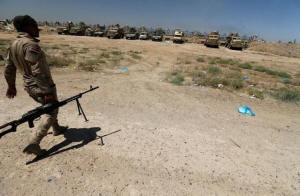|
Iraqi forces take Falluja government
building from Islamic State: state TV
 Send a link to a friend
Send a link to a friend
 [June 17, 2016]
By Thaier al-Sudani [June 17, 2016]
By Thaier al-Sudani
FALLUJA, Iraq (Reuters) - Iraqi forces
recaptured the municipal building in Falluja from Islamic State
militants, the military said on Friday, nearly four weeks after the
start of a U.S.-backed offensive to retake the city an hour's drive west
of Baghdad.
The ultra-hardline militants still control a significant portion
of Falluja, where the conflict has forced the evacuation of most
residents and many streets and houses remain mined with explosives.
A spokesman for the U.S.-led coalition backing Baghdad's quest to
recover large swathes of western and northern Iraq from Islamic
State told Reuters that government forces were "close (to the
building) but don't have control yet".
A military statement said the federal police had raised the Iraqi
state flag above the government building and were continuing to
pursue insurgents.
A Reuters photographer in a southern district of Falluja said
clashes involving aerial bombardment, artillery and machine gun fire
were continuing. Clouds of smoke could be seen rising up from areas
closer to the city center.
Heavily armed Interior Ministry police units were advancing along
Baghdad Street, the main east-west road running through the city,
and commandos from the counter-terrorism service (CTS) had
surrounded Falluja hospital, the statement said.
 Sabah al-Numani, a CTS spokesman, said on state television that
snipers holed up inside the hospital, considered a nest of
militants, were resisting but the facility was expected to be
retaken within hours.
Government forces, with air support from the U.S.-led coalition,
launched a major operation on May 23 to retake Falluja, an historic
bastion of the Sunni Muslim insurgency against U.S. forces that
toppled dictator Saddam Hussein, a Sunni, in 2003, and the
Shi'ite-led governments that followed.
The city is seen as a launchpad for recent Islamic State (IS)
bombings in the capital, making the offensive a crucial part of the
government's campaign to improve security.
U.S. allies would prefer to concentrate on Islamic State-held Mosul,
Iraq's second largest city that is located in the far north of the
country.
Enemies of Islamic State have uncorked major offensives against the
jihadists on other fronts, including a thrust by U.S.-backed forces
against the city of Manbij in northern Syria.
The offensives amount to the most sustained pressure on IS since it
proclaimed a caliphate in 2014. MASS DISPLACEMENT
Islamic State has begun allowing thousands of civilians trapped in
central Falluja to escape and the sudden exodus has overwhelmed
displacement camps already filled beyond capacity.
[to top of second column] |

Iraqi soldiers prepare to go to battle against Islamic State
militants at the frontline in Falluja, Iraq, June 14, 2016.
REUTERS/Thaier Al-Sudani

More than 6,000 families left on Thursday alone, according to
Falluja Mayor Issa al-Issawi, who fled the IS seizure of Falluja two
years ago. He told Reuters on Friday: "We don't know how to deal
with this large number of civilians."
The number of displaced people as of Thursday surpassed 68,000,
according to the United Nations, which recently estimated Falluja's
total population at 90,000, only about a third of the total in 2010.
Witnesses said Islamic State had announced via loudspeakers that
residents could leave if they wanted, but it was unclear why the
group changed tact after clamping down on civilian movement only a
few days ago.
The Norwegian Refugee Council (NRC), which has been providing aid to
displaced people, said escapees reported a sudden retreat of IS
fighters at key checkpoints inside Falluja that had allowed
civilians to leave.
Humanitarian needs were expected to increase dramatically in the
coming hours, swamping the resources of foreign aid groups and the
government as they struggle with funding shortfalls.
"Aid services in the camps were already overstretched and this
development will push us all to the limit," said NRC country
director Nasr Muflahi.
Islamic State, which by U.S. estimates has been ousted from almost
half of the territory it seized when Iraqi forces partially
collapsed in 2014, has used residents as human shields to slow the
military's advance and help avoid air strikes.

Defence Ministry spokesman Naseer Nuri said the surge in displaced
people was "proof that (Islamic State) has lost control over the
city and its residents".
(Additional reporting by Saif Hameed and Stephen Kalin in Baghdad;
Editing by Mark Heinrich)
[© 2016 Thomson Reuters. All rights
reserved.]
Copyright 2016 Reuters. All rights reserved. This material may not be published,
broadcast, rewritten or redistributed. |